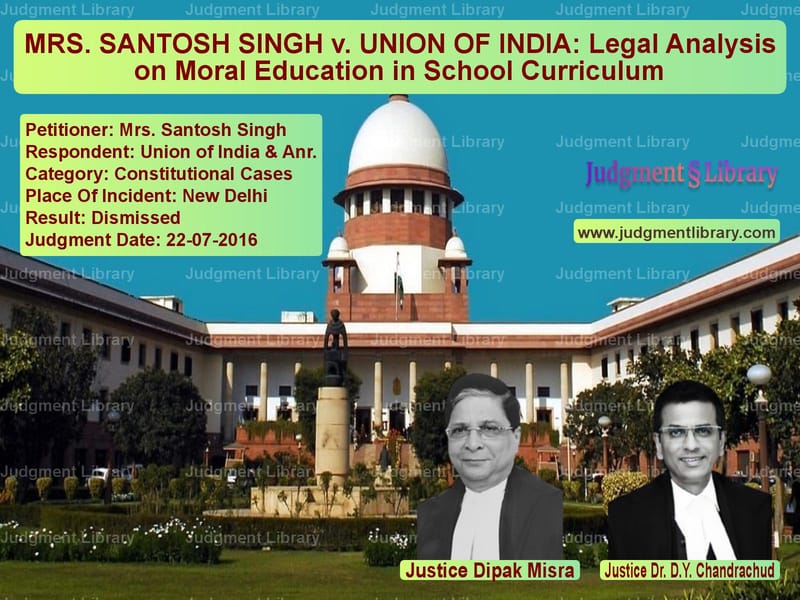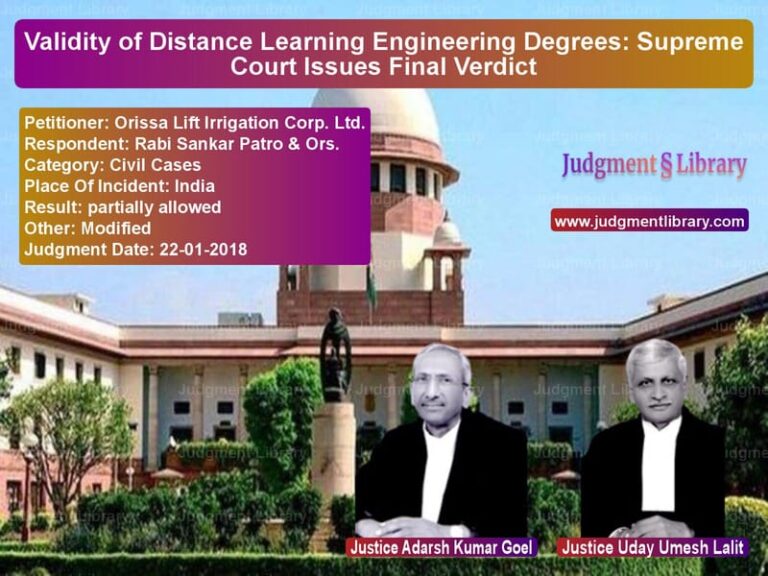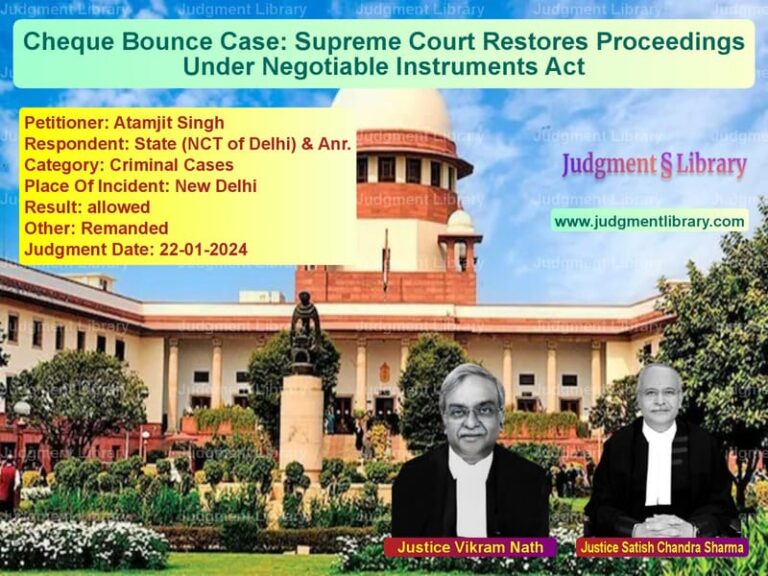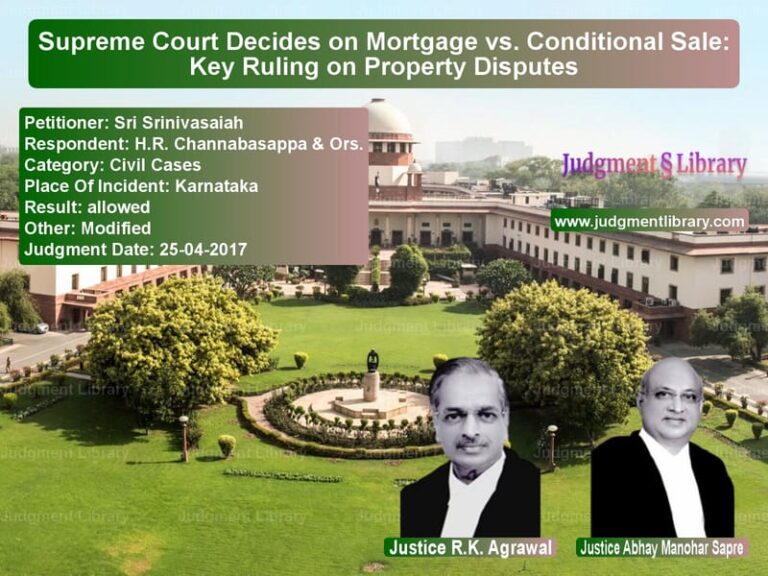MRS. SANTOSH SINGH v. UNION OF INDIA: Legal Analysis on Moral Education in School Curriculum
This case concerns a writ petition filed by Mrs. Santosh Singh, an advocate-on-record practicing before the Supreme Court, who raised concerns about the lack of moral education in the school curriculum. The petitioner invoked the jurisdiction of the Court under Article 32 of the Constitution, seeking a mandamus to include moral science as a compulsory subject in the curriculum for students from classes I to XII. The petition highlights the petitioner’s distress over the erosion of moral values in society and argues that moral education should be an integral part of school education to foster national character and instill values among the youth.
Introduction:
Mrs. Santosh Singh, the petitioner, claims that the current education system does not emphasize moral values and that there is an urgent need to introduce moral science as a compulsory subject in schools. The petitioner contends that this absence of moral education contributes to the erosion of moral values in society, where the pursuit of money has become the dominant goal. The petitioner believes that the state is under a constitutional obligation to provide educational facilities that instill moral values, especially in primary and secondary education. The case was brought before the Supreme Court for a decision on whether moral science should be made compulsory in the school curriculum.
Petitioner’s Arguments:
The petitioner argues that moral education is an essential component of value-based education, and it is the state’s duty to ensure that the education system promotes not only academic excellence but also the development of moral character in students. The petitioner points to Article 25 of the Constitution, which recognizes the freedom of conscience, and argues that the omission of moral science as a compulsory subject violates the fundamental duties enshrined in Article 51A(f), which calls for promoting the spirit of inquiry and humanism. The petitioner seeks a mandamus to introduce moral science as a compulsory subject in the syllabus of school education, from classes I to XII, in order to nurture national character and moral values.
Respondent’s Arguments:
The respondents, represented by the Union of India and the Central Board of Secondary Education (CBSE), argue that the current educational framework already includes the promotion of moral values through the curriculum. The respondents submit that the CBSE and other educational bodies have integrated moral education into various aspects of the curriculum, including co-curricular activities and assessments. CBSE emphasizes its efforts to inculcate values such as empathy, civic responsibility, and social-emotional learning through a three-pronged approach involving all stakeholders in the school community. The respondents argue that the issue of how moral education should be taught, and whether it should be a separate subject, is a matter of educational policy that should be addressed by the Ministry of Human Resource Development, not the courts.
The Court’s Analysis:
The Supreme Court, in its judgment, acknowledged the importance of moral values in education but emphasized that the judiciary should not dictate educational policy. The Court pointed out that the responsibility of determining the curriculum and the form of moral education lies with the executive branch of the government, not the judiciary. The Court stated that the issue of whether moral science should be made a compulsory subject in the school curriculum is a policy decision that requires careful consideration by educational experts and policymakers, rather than a judicial determination. The Court also referred to the National Policy on Education and the National Curriculum Framework, which already stress the importance of value-based education and the need to integrate moral values into the broader educational framework.
The Court further elaborated on the limitations of the judiciary in mandating specific changes to educational curricula, emphasizing that such matters involve ideological, social, and policy considerations that are better suited for legislative and executive action. The Court rejected the petitioner’s argument that a mandamus could be issued to force the introduction of moral science as a separate subject, as this would infringe on the policy-making prerogatives of the government. The Court concluded that the petition raised important issues but found no constitutional or legal basis for intervening in the manner proposed by the petitioner.
Conclusion:
The Supreme Court dismissed the writ petition, finding no merit in the petitioner’s request for a mandamus to introduce moral science as a compulsory subject in schools. The Court held that the inclusion of moral education in the school curriculum, and the specific manner in which it is taught, is a matter of policy for the government to decide. The Court emphasized that educational reforms and changes to the curriculum must be made through the appropriate legislative and executive processes, not by judicial fiat. The Court also dismissed the applications for impleadment and intervention, stating that the matter lay beyond the scope of judicial review. The petition was dismissed with no order as to costs.
Don’t miss out on the full details! Download the complete judgment in PDF format below and gain valuable insights instantly!
Download Judgment: Mrs. Santosh Singh vs Union of India & Anr Supreme Court of India Judgment Dated 22-07-2016-1741873357398.pdf
Direct Downlaod Judgment: Direct downlaod this Judgment
See all petitions in Fundamental Rights
See all petitions in Constitution Interpretation
See all petitions in Separation of Powers
See all petitions in Judgment by Dipak Misra
See all petitions in Judgment by Dhananjaya Y Chandrachud
See all petitions in dismissed
See all petitions in supreme court of India judgments July 2016
See all petitions in 2016 judgments
See all posts in Constitutional Cases Category
See all allowed petitions in Constitutional Cases Category
See all Dismissed petitions in Constitutional Cases Category
See all partially allowed petitions in Constitutional Cases Category







